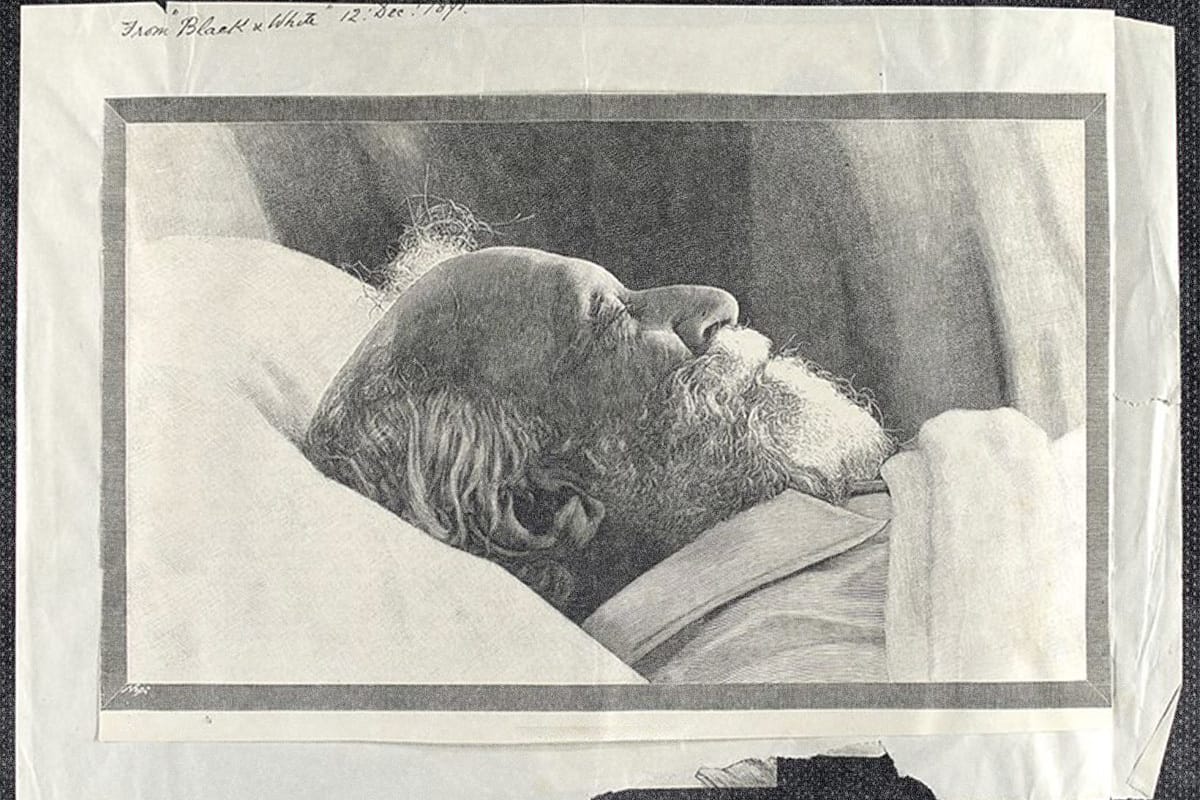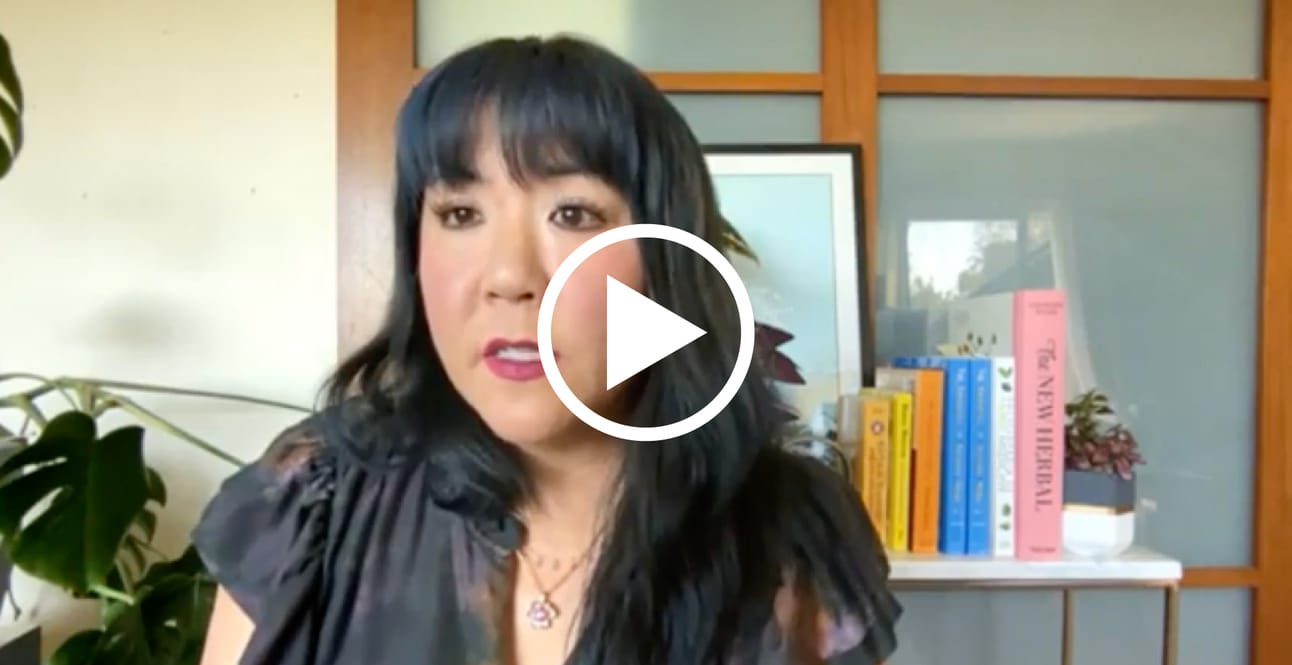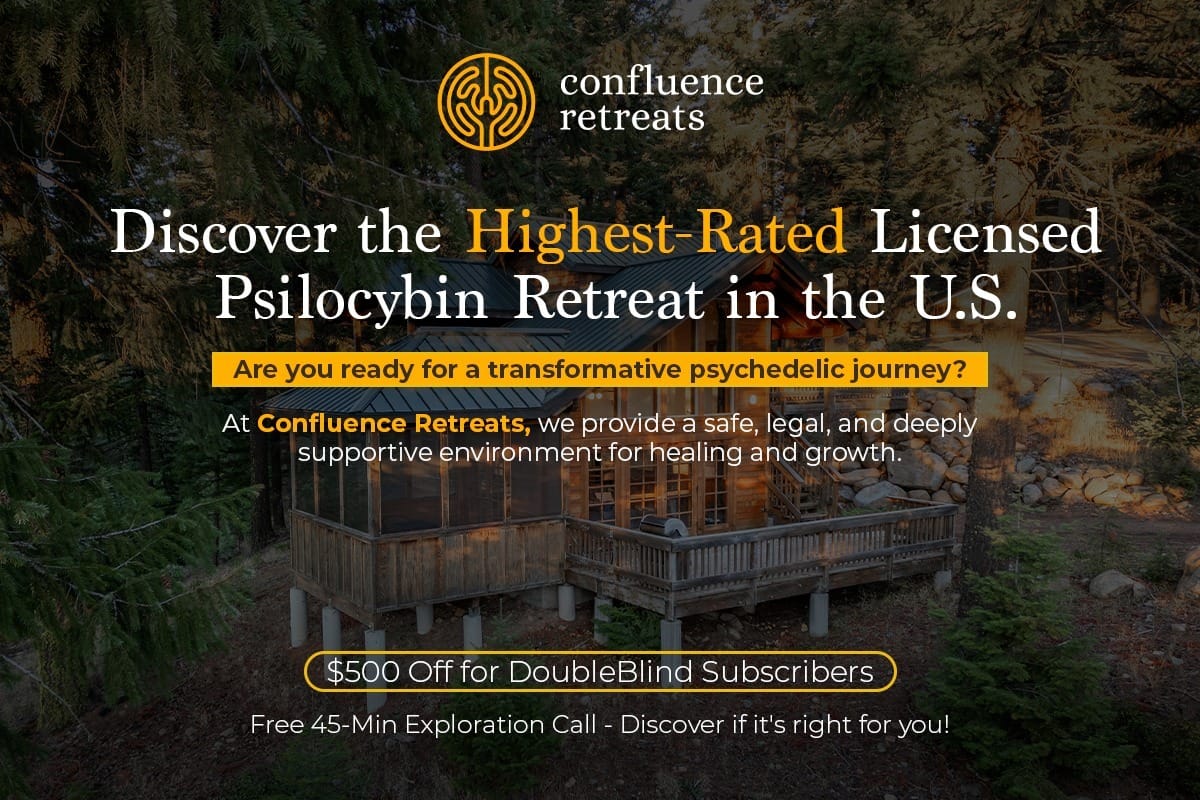
Welcome back to The Drop In, DoubleBlind’s newsletter serving up news, culture, and independent journalism about psychedelics straight to your inbox.
Today’s freshly reported news stories are about the importance of criticism within the psychedelics field and how psychedelics use is linked to a lower fear of death. You can find both of these pieces immediately below! If you keep scrolling, you’ll find stories on Jedi Flipping, African psychedelics, and music to listen to while you trip.
Stay hydrated💧
Mary Carreón
Senior Editor

Together With MysteryVibe
Arouse the whole vulva with Legato, the vibrating ring
Want to take your intimacy to new heights of sensual connection this Valentine’s Day?
Legato is a multi-award-winning vibrator ring that awakens every inch of her pleasure zones. It’s designed to stimulate the entire vulva—clitoris, labia, and everything in between. With 4 motors and an adjustable shape, it ignites every nerve ending, magnifying sensations everywhere she could possibly want them.
With a spacious opening for a partner (or another toy) and 16 intensity levels, it gives plenty for both partners to explore. It’s even gained a hot reputation among OB/GYN doctors for heightening arousal and increasing natural lubrication, making it perfect for postpartum and menopause (it’s even FDA-registered).
Right now you can save 35% with MysteryVibe’s Valentine’s Day Sale. Just click the link below 👇
Featured
Psychonauts Are Less Afraid of Death, New Research Says
A recent study suggests that psychedelics ease death anxiety by fundamentally reshaping how we perceive mortality.

At the root of most existential fears is the inevitability of death. But, a recent study published in the Journal of Psychoactive Drugs suggests that psychedelics may help ease the existential grip of mortality. Not by chemically suppressing fear with psychedelic substances but by facilitating experiences that involve transcending death, making those who consume them more acquainted with what it means to “die.”
The study, led by Ana Cláudia Mesquita Garcia from the State University of Campinas in Brazil, surveyed 517 adults, investigating their relationship to death through the Death Anxiety Scale, the Death Transcendence Scale, and the Spiritual Wellbeing Scale. Participants who frequently or occasionally used psychedelics — specifically LSD, psilocybin mushrooms, ayahuasca, and DMT — reported significantly lower levels of death anxiety than those who never or rarely used them. But it isn’t the substances themselves that reduce death anxiety, Garcia says; it’s the experiences they foster.
"Psychedelics promote experiences of death transcendence, which then reduce death anxiety," she tells DoubleBlind.
Psychedelics aren’t the only way to access these states, however. "I believe that various non-psychedelic experiences can also facilitate transcendence in ways that profoundly impact perception, emotional well-being, and existential concerns.”
Meditation, near-death experiences, and other contemplative practices can induce similar shifts, Garcia says. "Aldous Huxley pointed out in Heaven and Hell that altered states can be achieved through multiple means, from fasting to sensory deprivation."
The study also found that people with higher death anxiety were those seeking creative or symbolic forms of transcendence — whether through legacy-building, art, or literature. Ironically, this effort to live on after death may intensify their fear. "It is not the pursuit of creative transcendence that heightens death anxiety, but rather the opposite," Garcia says. "Individuals with higher death anxiety may feel a stronger need to find ways to symbolically 'continue living' beyond physical death."
But Garcia sees obstacles ahead despite the growing interest in using psychedelics for end-of-life care. "Regulatory and legal barriers remain a major hurdle — most psychedelics are still classified as controlled substances in many countries," she tells us.
Beyond that, she emphasizes the need for adequately trained professionals who know how to navigate psychedelic spaces. "Psychedelic-assisted therapy isn’t just about the substance; it requires careful preparation, guided experiences, and integration support."
There’s also a dire need for deep emotional and relational training around psychedelics in mainstream healthcare. "A compassionate and patient-centered approach is essential. Psychedelic therapies must be attuned to the emotional, psychological, and spiritual needs of those at the end of life."
"For me, psychedelic-assisted therapy can be a way of achieving spiritual and psychological healing, even when curing the body is no longer possible," she says.

Our Latest
Why Criticism Is Essential for the Future of Psychedelics
In a recent discussion, Rick Doblin and Jules Evans explored why the field struggles with scrutiny—and why honest critique is necessary if psychedelics are to move forward responsibly.

On Monday, February 3, Rick Doblin, founder and president of the Multidisciplinary Association of Psychedelic Studies (MAPS), joined journalist Jules Evans for an open discussion on cult dynamics within the psychedelic space. The discussion meandered from identifying the spectrum of cult-like dynamics to an array of issues in the space, including the topic of criticism. Psychedelic organizations and figures have faced plenty of scrutiny in recent months. Few have taken more heat than MAPS. Jules is also no stranger to criticism!
The conversation struck a chord. As a journalist who entered the world with an instinct for critique — which was sharpened by semesters studying its role in literature and society — there was a time, not all that long ago, when criticism wasn’t perceived as an act of war. But critique hits differently in the psychedelics space.
Why is it like this? Maybe it’s a long-term side effect of Drug War propaganda. Maybe it’s because people sometimes make psychedelics their identity. Maybe it’s the unintended consequence of living in echo chambers.
“For many people, psychedelics are their favorite, most sacred thing in the world,” Jules tells DoubleBlind. “They’re part of people's identity, values and community. And they’ve been illegal for decades. When the sacred and issues of identity are involved, people get defensive.”
For a long time — really, until the past couple of years — the only people writing about psychedelics were advocates embedded in the community. There is nothing wrong with this, but it can create a dynamic where important issues or discussions are overlooked because of the passion and infatuation that drives most advocates.
“Psychonauts have asked me, ‘Why aren’t you more of an advocate?’” he says. “I consider myself part of New Age culture more broadly, but I’m not so tied to psychedelics as the only ecstatic technique, it’s just one, and should be scrutinized like any other, especially if this is going to become promoted as medicine to the general public.”
That’s where the difference between criticism and an attack matters. True criticism isn’t about tearing something down — it’s about improvement. It points out the cracks so something stronger can take shape. An attack, on the other hand, isn’t about making things better. It’s personal, often reactionary, and meant to silence.
Criticism can sting! But a world without it — where no one examines the underbelly, and we pretend everything is all “love and light” — isn’t progress. It’s delusion. It’s the intellectual equivalent of surrounding yourself with “yes-men." Ideas go unchallenged, flaws fester, and before long, the whole thing collapses under the weight of its own unchecked hubris. Without critique, there’s no evolution, and we’re left with a stagnant loop of self-congratulatory nonsense.
Rick Doblin put it bluntly in the discussion: “The essence of science is criticism.” He’s right! Science doesn’t move forward without scrutiny — it evolves through constant testing, questioning, and refining. Critique isn’t just part of the scientific process; it is the process. Without it, theories go unchallenged, research stalls, and progress flatlines. No one wants that for psychedelics, no matter how divided opinions are on what the future of the space should look like — or how we should handle issues that arise. If this space is going to thrive, it needs a culture (and leaders) that welcomes hard questions, not one that silences them. Because ignoring the underbelly doesn’t make the critters disappear; it turns them into monsters.
“We need better ethical plumbing and systems of scrutiny and accountability,” Jules says. “Maybe that only happens when psychedelics are legalized in some form. Until then, I feel it’s responsible to warn the general public of [the] risks [associated with psychedelics], without denying the potential benefits.”
& More Must-Reads
Can magnesium ease MDMA side effects? Some ravers swear by it to prevent jaw clenching and comedowns—but does the science back it up? Experts weigh in on whether magnesium, 5-HTP, and other supplements actually help. Get the scoop.
Stanley Mouse’s iconic posters for The Grateful Dead didn’t just capture a moment—they became the visual heartbeat of psychedelic rock. We met with him to dive into his wild, acid-fueled journey from Haight-Ashbury to art world legend. Explore the story.
Despite deep spiritual and plant medicine traditions, Asians have been largely excluded from the psychedelic movement. Writer Preeti Simran Sethi explores the history, cultural stigmas, and why representation matters now more than ever. Read the full article.

Try DoubleBlind+
Unlock the Magic of Blue Lotus 🌿✨
Did you miss our Blue Lotus for Euphoria, Dreamwork, and Meditation workshop? The recording is now available for DoubleBlind+ members!
Learn from herbalist Sian Seligman and host Monica Cadena as they dive into the ancient and modern uses of Blue Lotus—how it enhances dreamwork, relaxation, and meditation, plus the best ways to consume it (tea, tincture, smoking, and more).
Watch now with DoubleBlind+ and access exclusive workshops every month!

Learn with Us
🎧 Music can shift your state of mind in an instant. If you ever feel overwhelmed on a trip, soothing tracks—from gentle instrumentals to grounding mantras—can help bring you back to center. Find the perfect chill-out playlist here.
🌿 Kava and kratom are ancient plants that have been used for centuries, but their journey into the Western world has been anything but smooth. So what’s next for these plants? Learn more here.
🌍From iboga and voacanga to the dream-enhancing Silene capensis, Africa holds a vast and largely untold history of plant medicines. Why do we know so little about them? Explore the history here.
🍄 Combining MDMA, LSD, and shrooms—known as Jedi Flipping—can be euphoric but also risky. From serotonin syndrome to heart strain. Get our harm reduction tips here.

DoubleBlind Digs
Here are today’s recommendations to help you live more psychedelically…
Say hello to America’s first USDA organic THC edibles. Cornbread Hemp is known to provide exceptional and safe hemp products, and these edibles are now their best-selling product. Formulated with a 1:1 ratio of THC to CBD (10mg of each), each gummy provides a balanced feeling of happiness without feeling overwhelmed or couch-locked. Sounds pretty great, right? Better yet, DoubleBlind readers can get 30% off your first order using code RESOLUTION.*
Looking to deepen your psychedelic practice? The Vital 12-month training by Psychedelics Today is designed for those seeking a career in psychedelic therapy, coaching, or facilitation. Enrollment is now open for their May cohort, and they are offering $2,000 off until February 7! Apply now
Serious about spores? Inoculate the World has you covered. As a globally trusted supplier, they offer an extensive selection of high-quality viable spores—plus international shipping. DB readers get 10% off with code doubleblind at checkout. Shop spores here.
*One-time purchases only, cannot be combined with subscription discounts.
We may earn a commission on purchases made through the links above. Affiliate partnerships with aligned brands go directly toward funding our independent journalism.
Together With Confluence Retreats
The Highest-Rated, 100% Legal Psilocybin Retreat in the U.S.
Located deep in the Oregon forests, Confluence is the leading psychedelic retreat in the US.
Their team has been integral to the development of Oregon’s psychedelic therapy program and guided over 1000 participants over the last 6 years.
Confluence is the real deal.
They offer a beautifully held container rooted in indigenous wisdom, trauma-informed care, and holistic modalities.
If you’ve been considering a psilocybin retreat, Confluence is one of the best there is.
Use this link to save $500 off a retreat:
Book your psilocybin retreat today

Watch Now
Can psychedelics transform aging? Shelby Hartman and journalist Abbie Rosner explore how baby boomers are using psychedelics to navigate life, death, and mental well-being. Tune in for a fresh take on elderhood and consciousness.

Around the Web
A year after attending a psychedelic retreat in Mexico, nine veterans reflect on how psilocybin and 5-MeO-DMT impacted their PTSD, mental health, and outlook on life. Read more and watch on CBS News.
Can psychedelics help heal racial trauma and fuel liberation? Dr. Nicholas Powers says yes—and his new book explores how. Read more in Boing Boing.
From Silicon Valley to government insiders, a network of powerful figures is pushing to legalize psychedelics. But as the movement gains momentum, cracks are beginning to show. Read more in The New Statesman.
How was today's Drop In?
💌 If you loved this email, forward it to a psychonaut in your life.





